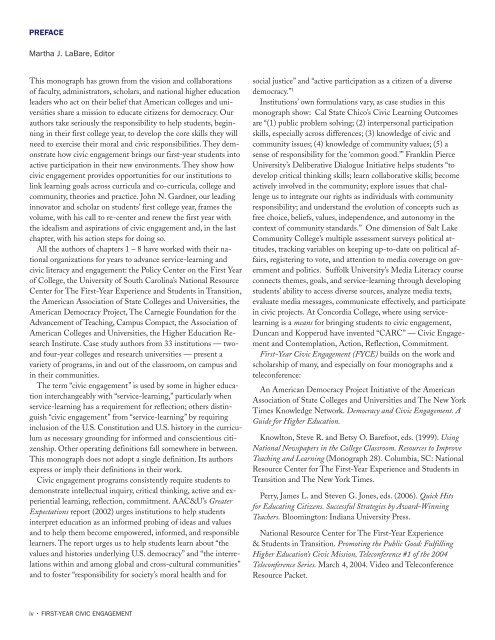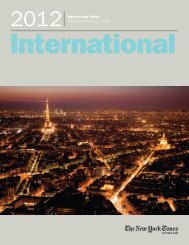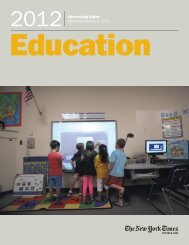First-Year Civic Engagement: Sound Foundations for College ...
First-Year Civic Engagement: Sound Foundations for College ...
First-Year Civic Engagement: Sound Foundations for College ...
Create successful ePaper yourself
Turn your PDF publications into a flip-book with our unique Google optimized e-Paper software.
PREFACEMartha J. LaBare, EditorThis monograph has grown from the vision and collaborationsof faculty, administrators, scholars, and national higher educationleaders who act on their belief that American colleges and universitiesshare a mission to educate citizens <strong>for</strong> democracy. Ourauthors take seriously the responsibility to help students, beginningin their first college year, to develop the core skills they willneed to exercise their moral and civic responsibilities. They demonstratehow civic engagement brings our first-year students intoactive participation in their new environments. They show howcivic engagement provides opportunities <strong>for</strong> our institutions tolink learning goals across curricula and co-curricula, college andcommunity, theories and practice. John N. Gardner, our leadinginnovator and scholar on students’ first college year, frames thevolume, with his call to re-center and renew the first year withthe idealism and aspirations of civic engagement and, in the lastchapter, with his action steps <strong>for</strong> doing so.All the authors of chapters 1 – 8 have worked with their nationalorganizations <strong>for</strong> years to advance service-learning andcivic literacy and engagement: the Policy Center on the <strong>First</strong> <strong>Year</strong>of <strong>College</strong>, the University of South Carolina’s National ResourceCenter <strong>for</strong> The <strong>First</strong>-<strong>Year</strong> Experience and Students in Transition,the American Association of State <strong>College</strong>s and Universities, theAmerican Democracy Project, The Carnegie Foundation <strong>for</strong> theAdvancement of Teaching, Campus Compact, the Association ofAmerican <strong>College</strong>s and Universities, the Higher Education ResearchInstitute. Case study authors from 33 institutions — twoandfour-year colleges and research universities — present avariety of programs, in and out of the classroom, on campus andin their communities.The term “civic engagement” is used by some in higher educationinterchangeably with “service-learning,” particularly whenservice-learning has a requirement <strong>for</strong> reflection; others distinguish“civic engagement” from “service-learning” by requiringinclusion of the U.S. Constitution and U.S. history in the curriculumas necessary grounding <strong>for</strong> in<strong>for</strong>med and conscientious citizenship.Other operating definitions fall somewhere in between.This monograph does not adopt a single definition. Its authorsexpress or imply their definitions in their work.<strong>Civic</strong> engagement programs consistently require students todemonstrate intellectual inquiry, critical thinking, active and experientiallearning, reflection, commitment. AAC&U’s GreaterExpectations report (2002) urges institutions to help studentsinterpret education as an in<strong>for</strong>med probing of ideas and valuesand to help them become empowered, in<strong>for</strong>med, and responsiblelearners. The report urges us to help students learn about “thevalues and histories underlying U.S. democracy” and “the interrelationswithin and among global and cross-cultural communities”and to foster “responsibility <strong>for</strong> society’s moral health and <strong>for</strong>social justice” and “active participation as a citizen of a diversedemocracy.” 1Institutions’ own <strong>for</strong>mulations vary, as case studies in thismonograph show: Cal State Chico’s <strong>Civic</strong> Learning Outcomesare “(1) public problem solving; (2) interpersonal participationskills, especially across differences; (3) knowledge of civic andcommunity issues; (4) knowledge of community values; (5) asense of responsibility <strong>for</strong> the ‘common good.’” Franklin PierceUniversity’s Deliberative Dialogue Initiative helps students “todevelop critical thinking skills; learn collaborative skills; becomeactively involved in the community; explore issues that challengeus to integrate our rights as individuals with communityresponsibility; and understand the evolution of concepts such asfree choice, beliefs, values, independence, and autonomy in thecontext of community standards.” One dimension of Salt LakeCommunity <strong>College</strong>’s multiple assessment surveys political attitudes,tracking variables on keeping up-to-date on political affairs,registering to vote, and attention to media coverage on governmentand politics. Suffolk University’s Media Literacy courseconnects themes, goals, and service-learning through developingstudents’ ability to access diverse sources, analyze media texts,evaluate media messages, communicate effectively, and participatein civic projects. At Concordia <strong>College</strong>, where using servicelearningis a means <strong>for</strong> bringing students to civic engagement,Duncan and Kopperud have invented “CARC” — <strong>Civic</strong> <strong>Engagement</strong>and Contemplation, Action, Reflection, Commitment.<strong>First</strong>-<strong>Year</strong> <strong>Civic</strong> <strong>Engagement</strong> (FYCE) builds on the work andscholarship of many, and especially on four monographs and ateleconference:An American Democracy Project Initiative of the AmericanAssociation of State <strong>College</strong>s and Universities and The New YorkTimes Knowledge Network. Democracy and <strong>Civic</strong> <strong>Engagement</strong>. AGuide <strong>for</strong> Higher Education.Knowlton, Steve R. and Betsy O. Barefoot, eds. (1999). UsingNational Newspapers in the <strong>College</strong> Classroom. Resources to ImproveTeaching and Learning (Monograph 28). Columbia, SC: NationalResource Center <strong>for</strong> The <strong>First</strong>-<strong>Year</strong> Experience and Students inTransition and The New York Times.Perry, James L. and Steven G. Jones, eds. (2006). Quick Hits<strong>for</strong> Educating Citizens. Successful Strategies by Award-WinningTeachers. Bloomington: Indiana University Press.National Resource Center <strong>for</strong> The <strong>First</strong>-<strong>Year</strong> Experience& Students in Transition. Promoting the Public Good: FulfillingHigher Education’s <strong>Civic</strong> Mission, Teleconference #1 of the 2004Teleconference Series. March 4, 2004. Video and TeleconferenceResource Packet.







